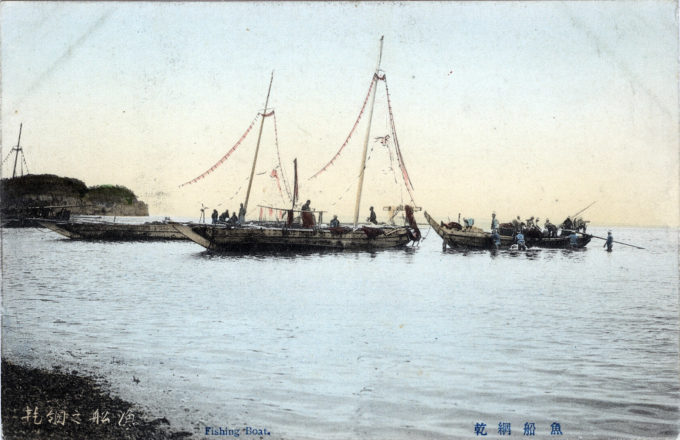See also:
“A fishing place in Awaji”, Hyogo Prefecture, c. 1920.
Fishing with cormorants, Gifu, c. 1930.
Uogashi (Fish Market) at Nihonbashi, c. 1910.
“Owing to its geographical position, to the direction of the marine currents in its vicinity and also to the abundance of suitable indentations along the well-wooded coast, Japan is an ideal country for the fishermen.
“It is not surprising therefore that there are 900, 000 families of fishermen or of persons engaged in the marine industry, or over three million individuals, and that the number of fishing boats total over 400, 000.
“Fish and other marine products have constituted from olden times important items of food – stuffs of our people, and this partiality of ours … is also shared by our nearest neighbors the Chinese who have been , for centuries back , principal purchasers of our marine products.
“… The different kinds of fishing-gear used in Japan are too numerous to be enumerated here in detail. [But] the principal kinds of gears for net-fishing are as follows :
The pound-net is extensively used throughout the country. In Hokkaido it is used for herring and salmon, and in Honshu and Kyūshu for capturing tunny, yellow-tail, bonito, etc. A net of this kind can sometimes measure as long as several thousand yards long; The seine net is used for capturing sardine, anchovy and other shoal fish. It is, in this country, one of the latest innovations in the line of nets, having been made after an American model. Sometimes a seine-net is of enormous size, extending as long as three miles in length. Then there are drift-nets, grill-nets, trawl-nets, dredge nets, etc; There is also another kind of net called shiki-ami (spread-net) which is spread on the bottom, and lifted up to catch the fish that happen to enter it.”
– Japan in the Beginning of the 20th Century, published by the Department of Agriculture and Commerce, Tokyo, 1904



Pingback: “Dried bonito dealer”, c. 1920. | Old Tokyo
Pingback: “Fish Street-vender in Japan”, c. 1920. | Old Tokyo